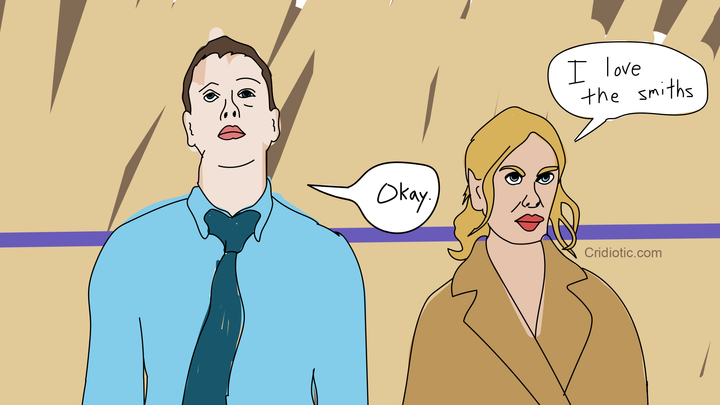Dear Men, Fight Club (1999) is making fun of you. Let's talk about it.
A discussion of Fight Club (1999) and it's message about toxic masculinity. I discuss the film as a dark comedy about masculinity.

Fight Club (1999), directed by David Fincher and based on Chuck Palahniuk’s novel is nothing short of iconic. Although to many, it might be for the wrong reasons.
If you haven’t seen it, spoilers are coming. Peep the trailer here if you feel like it.
“We’re consumers. We’re the by-products of a lifestyle obsession. Murder, crime, poverty—these things don’t concern me. What concerns me are celebrity magazines, television with 500 channels, and some guy’s name on my underwear.”
Tyler Durden (Brad Pitt) said this to the unnamed Narrator (Edward Norton) in David Fincher’s Fight Club (1999). In Durden’s view, society relies too much on consumption, and often, consumption dictates who we are. Perhaps, Durden is right. However, he responds to the society he perceives as plagued by over-consumption with behaviors like violence, sexism, emotional stifling, dominance, and destruction. Tyler’s philosophy, though delivered through a charismatic figure, is not meant to demonstrate behaviors to be emulated or paint Durden as some kind of personal savior. His destructive response to societal dissatisfaction highlights the ways men are conditioned to cope with their struggles. Remember the part where The Narrator's (Edward Norton) character kills Tyler Durden? His murder is a rejection of both consumption and hyper-masculinity as a framework for approaching society.
Let's talk about Fight Club.
First, the film is an exaggeration. The film attempts to be ridiculous and operates as a bit of a dark comedy by exaggerating solutions, behaviors, and outcomes. If you've never watched it through this lens, I suggest returning to it. For example, the film begins by demonstrating that The Narrator is so emotionally repressed that he has to pretend to be dying in support groups just to cry and sleep. In other words, he has to go to absurd extremes to be able to express his emotions, rather than feeling them or dealing with them in a more constructive way. He is an exaggerated depiction of how men often feel unable to deal with their woes.
This is further supported as once Marla Singer (Helena Bonham Carter) knows the real him, he can no longer deal with his emotions again. An exaggeration perhaps, but it sets up two important things: The Narrator cannot simultaneously be himself and deal with his emotional problems; The Narrator relies on external identities to respond to society. This is when The Narrator begins to create Tyler as his external identity. We get the iconic "hit me as hard as you can," request from Tyler to The Narrator, demonstrating an outlet for his emotions. The Narrator has to put himself through physical pain just to be able to feel something, which I argue adheres to the hegemonic expectations of men. Often, men feel the physical rather than the emotional is an appropriate outlet for them. It's laughable, maybe, but it's also sad that this character goes to great extremes just to find an outlet.
Tyler, a concoction of Edward Norton's insomnia-ridden, depressed brain, is the embodiment of peak masculine ideals. He is the Narrator's response to feeling jaded by society and not knowing how to deal with it in ways that are both productive and ideal based on masculine expectations. He is conventionally attractive, charismatic, and confident, yet he also has a disregard for others and their feelings and is apathetic toward his emotions, danger, and his physical state. He operates as a manifestation of unfulfilled emotional needs pushed to hegemonic traits for men: Apathy & anger. To clarify, this apathy and/or anger is just what men feel they will not be policed for. They are often told by different societal figures that showing emotions outside of anger, being caring, or showing weakness is bad. The opposition to this, in a nutshell, is Tyler's philosophy.
The film tries to slap men in the face with the idea that Tyler is a shit way to be. In the early aughts, Tyler smokes cigarettes, inserts pornography into children's films, and then farts on and otherwise defiles people's food just for shits and giggles. This is his introduction. This early rejection of both safety, social expectations, and the fat cats whose food he messes with, is how Durden (and The Narrator) deals with perceived woes. It is an early way that The Narrator demonstrates how his hyper-masculine persona intends to attack the world through risk, hyper-sexuality, aggression, and general disregard for others, their thoughts toward him, his impact on them, and their safety.
But the key to the film is the allure of Tyler. Tyler is alluring, but he makes the lives of people objectively worse throughout the film. This is where, in my view, some confuse Tyler as a figure to emulate. He lives in, as the narrator describes, a "shit hole," he convinces men to senselessly fight others on the street and hurt themselves in the name of 'liberation' from society (again, rather than pursuing a healthier outlet), and eventually, he starts a cult. None of his solutions are constructive, really. They are that of rejection of emotions because of feeling jaded by the way society functions, while ironically, his followers in the film (and arguably in real life) become in servitude to his brand of masculinity and it leads to negative outcomes.
I suppose that inescapable masculine expectations is the point of the cult in the film. Often, cults are manipulative and coercive. In fact, as the numbers within this masculine cult grow, there is not much choice to avoid it. It literally and figuratively blows up society while forcing those in the cult to remain within it, and impacting those not within it. Thus, the film should be applauded as a beautifully done way of demonstrating that toxic masculinity is alluring because of how men are told they should be. And, on the other side of things, it should be praised for its ability to show how men are often pressured and policed into this role, and are afraid of stepping outside of it.
Unfortunately, many read the film wrong. While Tyler represents the extreme end of masculinity, he offers no viable alternative besides further destruction, anger, and subservience to the destructive outcomes of masculinity. Tyler critiques consumerism and conformity, but his solutions are flawed:
Man, I see in fight club the strongest and smartest men who've ever lived. I see all this potential, and I see squandering. God damn it, an entire generation pumping gas, waiting tables; slaves with white collars. Advertising has us chasing cars and clothes, working jobs we hate so we can buy shit we don't need. We're the middle children of history, man. No purpose or place. We have no Great War. No Great Depression. Our Great War's a spiritual war... our Great Depression is our lives. We've all been raised on television to believe that one day we'd all be millionaires, and movie gods, and rock stars. But we won't. And we're slowly learning that fact. And we're very, very pissed off.
Let this quote sink in. Does Tyler really say anything here? It might piss us off, sure, and it might make us want change. But his response does the opposite of change. It inspires us with some words about societal blights, and there is something to the rejection of consumption, generally speaking. But his response makes society even worse. It's a critique about feeling powerless toward change and how patriarchal-led promises have not come to fruition. Tyler literally and figuratively blows up society, but he does not fix anything or offer any meaningful solutions. He only inspires men to get more pissed off, ironically adhering to what society allows them to while attempting to reject society. Those who feel the promises of the American Dream have not come to fruition agree to be one of his followers, fight people, commit crimes, and cut off testicles.
By the end of the film, The Narrator realizes that Tyler is not a solution but part of the problem. He opts to kill himself–An extreme example of how bad embodying Tyler's overtly masculine philosophy can get. Look at it this way: The Narrator still lives in a shit world run by Tyler; this is an allegory for the reality that consumerism and masculine expectations still exist. However, he is now able to do perhaps what he should have done all along: Be more authentic with his emotions and honest about what he wants from life. It's the best he can do in a fucked up world, and its not a perfect solution–but it's the best one for him.
The film probably goes slightly wrong by setting up the idea that a capitalist dystopia sucks, and this is the escape from that. But on the flip side, the idea is that society does suck, but this is not how to be. The film does indeed do a great job of depicting that the daily race can suck ass– But it's not meant as a self-help book. Rather, it simply tells us, "hey, when you're upset about life, here is what not to do." All of these men join in on senseless violence in society to deal with their perceived problems. It causes pain, destruction, and harms both those involved and those not involved.
Those who still love Tyler despite the film's intent are no different than those who dedicate themselves as his cult members by doing everything he says. I'm reminded of how conspiracy theorists try to respond to society by acting as if they somehow know better than others. Thinking Tyler is cool might make you feel interesting, superior, and smarter than everyone else–and clearly there is allure in those feelings. But realistically, everyone just thinks you're a moron.


Comments ()